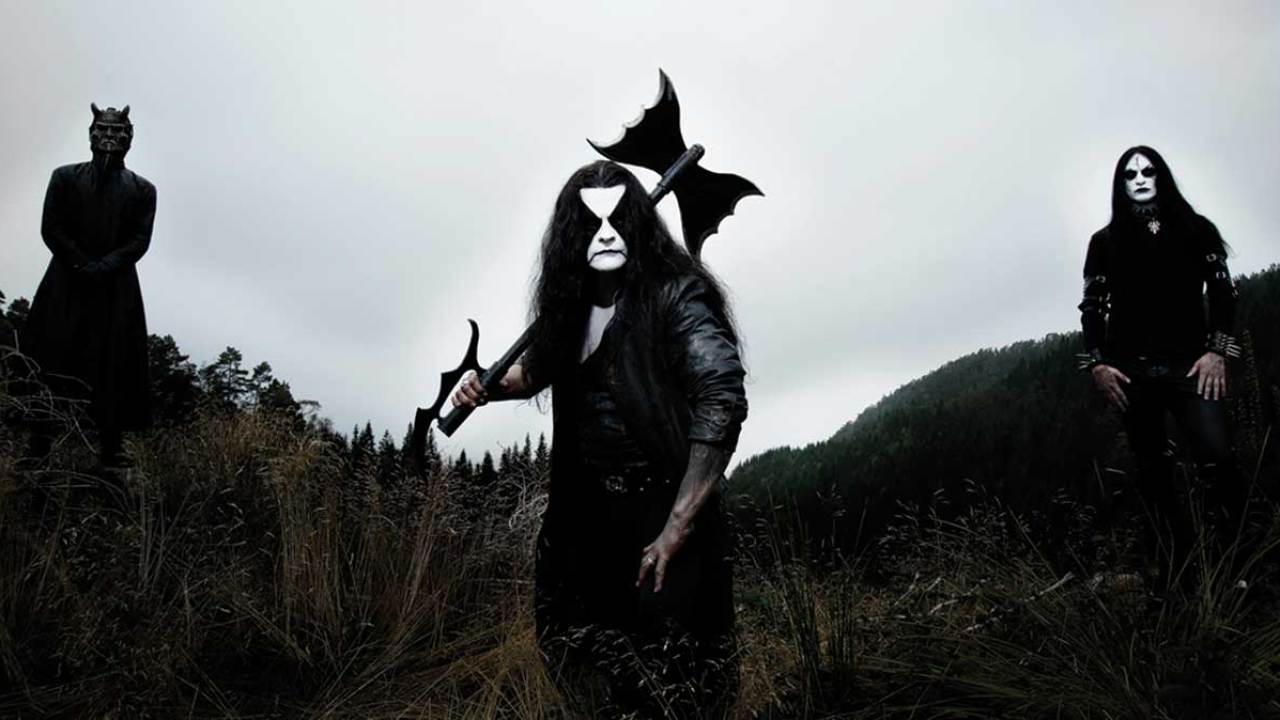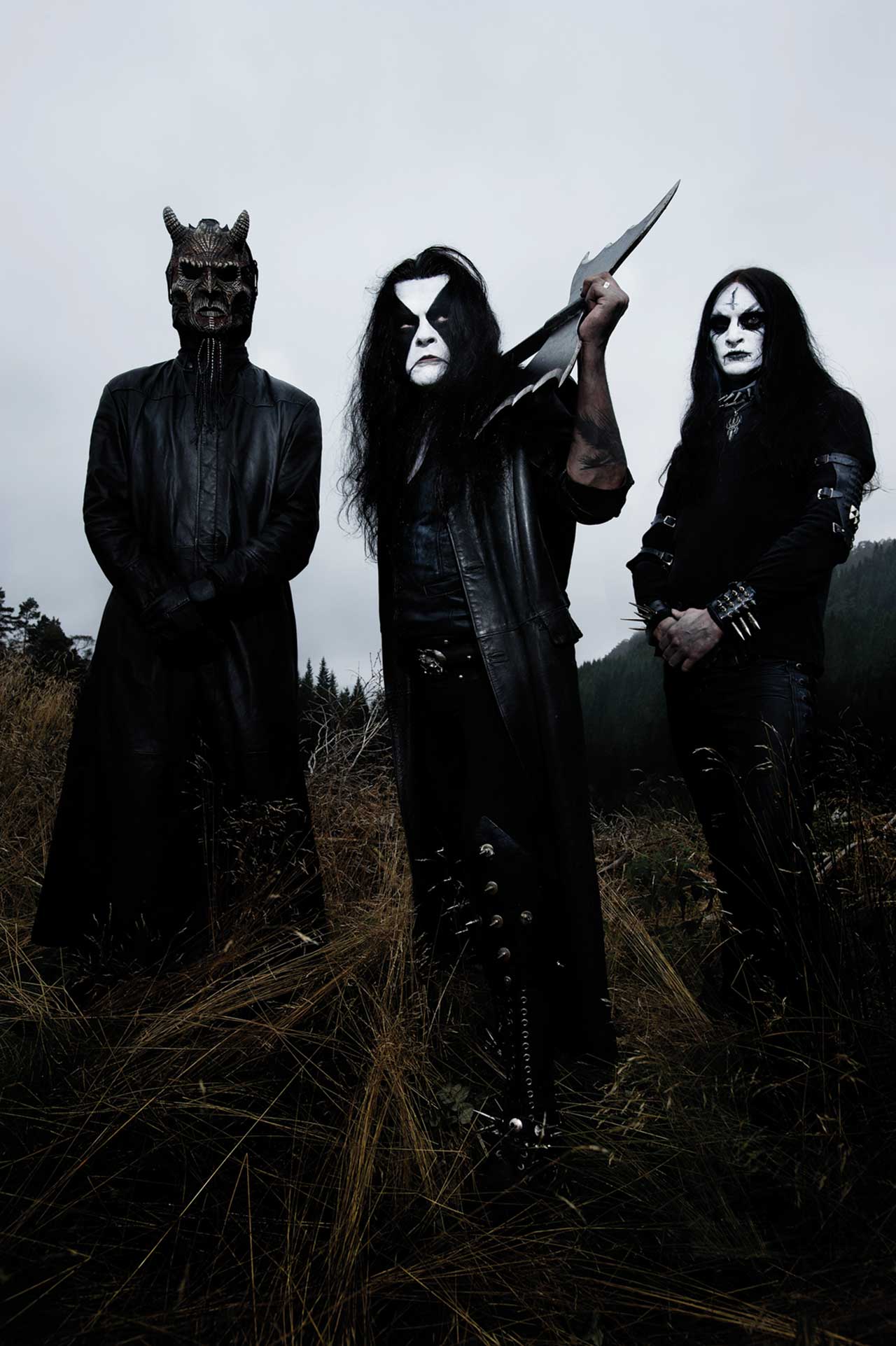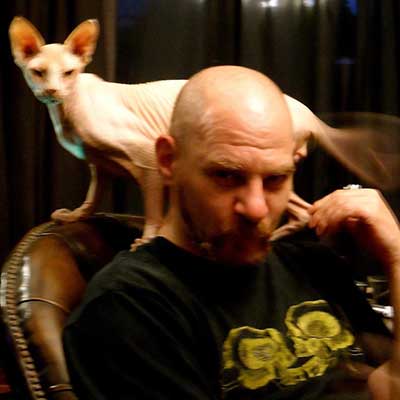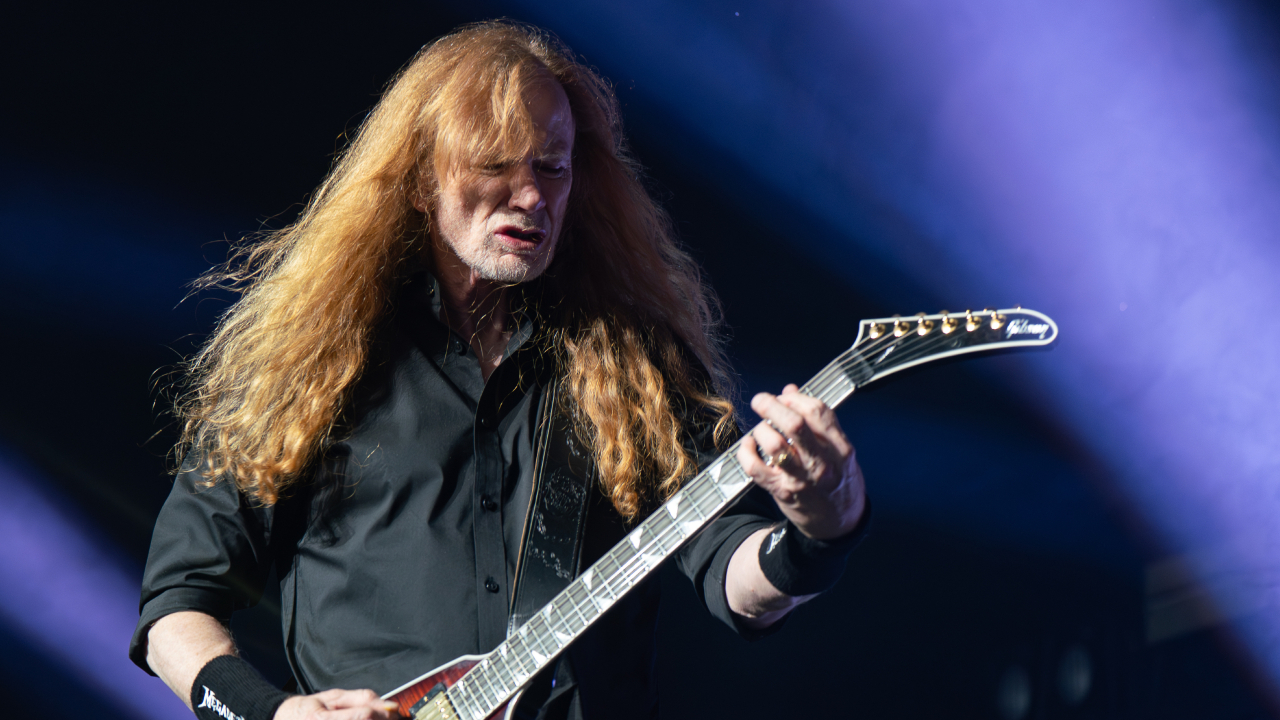Why Abbath is now stronger than ever
One of the most iconic figures in extreme metal, Abbath has weathered the storm of his breakup with Immortal, but for him, the battle has only just begun

The battle horns have sounded. Unless you’ve been sitting in a log cabin the past few months, you’ll have seen it all: Hammer’s gone-viral pictures of Abbath and his new bandmates, King and Creature, invading famous London landmarks and proving that you don’t need Photoshop to show how the world warps around the frontman; the live, in-studio video for the insurrectionary charge of Fenrir Hunts offering a visceral insight into the new trio as a fully fledged, bloodthirsty sonic battalion; and the unleashing of the new album track Winter Bane, its sweeping riffs like huge scythes sending plumes of frost into the biting winter air.
“I got my genes from rock’n’roll very early, starting at five years old, the first rock’n’roll song I ever heard. I never forget it.” And Abbath breaks into song. “‘I found my thrill… on Blueberry Hill…’ Every time I hear that fucking song I get goosebumps. And I discovered Elvis and then this crazy super-spaceman, fire-breathing monster from the Kiss cards in the candy bags. Then I heard Destroyer for the first time. Your friends you grow up with, they’re like, ‘When I grow up I want to be a policeman, what do you want to be when you grow up?’ ‘Gene Simmons!’ I didn’t know how to say it back then, so for many years I said ‘Genne See-mon.’ And I realise now, Paul Stanley, he’s lost. It’s Ace and Gene. They should sit down and make a new album. That would be fucking awesome, I’m sure.”
Sitting in his home studio in Bergen, with pictures of meetings with Gene, Lemmy, Tony Iommi and numerous other rock icons bedecking the walls of the room next door, Abbath is in garrulous if free-roaming mood. A man who’s still emerging from not just the break-up of his band that had become an institution on the metal landscape, but the loss of long-time brothers in arms Demonaz and Horgh, you get the feeling that numerous threads are all fighting in the same mental space. Self-examination, recollections, excitement, obsession with a narrative of rock’n’roll that’s set the terms for his entire life, illustrative bursts into song as if to prove that point and tangents you soon realise are pointed metaphors get tested out in real time, brought into focus by the determination and uncontainable belief that’s marked him out as one of the most iconic, if idiosyncratic frontmen in the metal world. As to the creation of Abbath, therein lies a tale, too.
“How the fuck do you deal with the world? Deal with yourself first
“Right at the beginning, we just had white make-up. So I was at home, bored, went into the bathroom, put the white on my face and looked at myself and thought, ‘You know what? I want to be my own character.’ I took some black, just did this and that and went, ‘Ahh, Gene Simmons,’ and I filled it with black. I came up with Demonaz. Harald, he came up with the name Immortal for the band, but he insisted suddenly, ‘I want to be called Demonaz.’ OK, if you insist. ‘I insist.’ OK. And then I thought: What am I going to be called then? Blackthorne! But then I realised Bob Kulick had a band called Blackthorne. So the first time I had a picture of it, then the name came to my mind: Abbath. And I looked at the mirror, and said, ‘That’s Abbath.’ And that’s a fact. It’s a very special thing, and I take that face and that part of me dead seriously. But also what David Lee Roth said: don’t take everything too seriously in life. It doesn’t matter if you win or you lose, it’s how fucking great you look. Heheheh! Yeah, that was when Abbath was born.”
Over a span of 24 years, Immortal occupied a singular space in Norway’s black metal scene. Embedded in neither the Oslo nor nearby Bergen battlegrounds, remote from the church burnings, murders (although Burzum’s Varg Vikernes cut his teeth in Old Funeral, the first band Abbath and Demonaz played in together, after the duo had departed), and Satanism that marked out the scene’s tempestuous birth throes. Their love of Kiss, Venom and Bathory came with no added agenda other than their desire to embody the constantly regenerative, life-changing capacity of rock’n’roll. Black metal might have been their medium, but Immortal were more than that: larger-than-life spawn from heavy metal’s boundless mythos, and creators of one that they could call their own.

“The Oslo guys, they called their stuff Grymyrk [the name of the seminal Thorns demo that was doing the rounds at the time],” Abbath recalls, “and that was the scene over there. Me and Demonaz, we were kind of kind of loners here, but over there there was this black metal community – there was Darkthrone, Mayhem. But we were, ‘OK, you guys are Grymyrk, our department is fucking Blashyrkh.’ So if it’s not Bergen, it’s definitely 30km south.”
Sign up below to get the latest from Metal Hammer, plus exclusive special offers, direct to your inbox!
Blashyrkh was the imaginary, if fully fledged and frostbitten realm all Immortal albums were immersed in, awash in battles, blizzards, mountain tops, mammoth- sized billowing riffs, Abbath’s Goblin-King croak and a serrated, ice-bitten guitar tone that carved an exhilarating and immediately identifiable path through the extreme metal landscape. Some thought they were taking the cause of black metal in vain. Many more were simply in thrall to a band whose freedom from allegiances and self-consciousness took them to visionary, over-the-top realms their peers feared to tread.
The cracks first appeared when Demonaz’s tendonitis forced him to put down his guitar and concentrate on lyric writing: a change to the internal dynamics of the band they fought to recover from since. Immortal decided to call a halt in 2003, returned in 2007 and three years later put out the glorious – if fatefully titled – All Shall Fall before the core collapsed, seemingly for good, last year during the recording of the follow-up album.
In-studio arguments reached an impasse, Abbath attempted to replace Horgh and newest recruit Apollyon, leading to a final feud with Demonaz that split the partnership up for good. Abbath partnered with King and Creature for his new venture; Demonaz – after a potential court case was averted – decided to keep the Immortal name.
Abbath is surprisingly conciliatory about the prospect. “I wish both Horgh and Demonaz well,” he says. “I never have and I never will think that I’m Immortal. I was the frontman, yeah, but I didn’t represent Immortal on my own. The band was everything in my life. You want it to work, it’s your guys, you know? Your family. And it doesn’t and you don’t know how to deal with it, it’s like, ‘What the fuck?’ Maybe it was never their intention, but maybe they did me a favour. Lemmy would never have left Hawkwind if he wasn’t fired. Horgh and Harald, they ended up firing me. Maybe that was not their intention, but that’s what happened. So OK, if you fire me and continue with Immortal, then you’d better fucking show that you’re worthy of representing the name. If they do that, all hail to them.”
Before Abbath could move on and become Abbath, however, certain co-ordinates had to be fixed in place.
“I never thought about going solo, but then someone said, ‘Maybe you should.’ And I said, ‘OK, but I don’t see my name as a band name. I’m a soldier of Immortal,’” he remembers. “I said, ‘Get the right logo!’ Because if I didn’t have the right logo, there would never be an Abbath band.
“And there was back and forth and this guy, he was English, and I was never satisfied but suddenly he had it, and it was, OK, let’s go on with Abbath. That’s the reason I’m doing this now. I would never fucking do it unless I had the best logo ever. When you see beyond the logo, it’s just a name, and then you reach my character.”
With death and rebirth comes transformation. Not only is the forthcoming eponymous album rawer, more visceral and organic than All Shall Fall, the concept of Blashyrkh has been jettisoned for a different approach courtesy of new lyricist Simon Dancaster, its battle-scorched tale of an alchemist’s path towards enlightenment rather apt under the circumstances. Abbath himself is using this opportunity to take stock.
“What I’m doing now,” he declares, “is I’m taking care of business and I’m feeling at one with my spirit side. I thought I lost it but I got it back. I’m so lucky that I have all the people around me believing in me and believing in what I do. Creature, he’s Dave Lombardo on blasts. I have Dave Lombardo! It’s just fucking amazing. And with King I have the John Paul Jones of extreme metal on bass. He’s come in and he has saved Abbath. And what is the world without Abbath? Heheheh!
“But that’s what I’m talking about. I feel so much responsibility now, and from next week, I told everyone, I’m going to quit smoking, I’m going to quit drinking, quit all my other vices. It’s not happy-go-lucky now. Now we are entering the training camp for battles in Europe, and battles in the States – we’re going to battle all over the fucking place.”
If you continue with Immortal, you’d better show you’re worthy of the name
‘As above, so below’ goes the ancient hermetic adage: the personal struggles within, and the will to effect change, mirror, and are mirrored by, the world beyond. For all the brutal battle imagery charging through Abbath, its tale of a warrior undergoing a bloody yet ultimately cleansing rite of passage are bound to Abbath’s own, transformative journey – not just his self-searching and rebirth from the ashes of Immortal but also in the way he’s often based his riffs on classic bands yet bent them through his own ice-cast prism until they become something singular and in his own, striking image. As he says of relationship to his rock’n’roll heroes, “I’m here for rock’n’roll, I’m here for heavy metal – our way. Our generation. We all want our fathers to be proud of us. I’m 42, and if I’m not taking over now, I never will.”
Now he’s found a new, more terrifyingly contemporary resonance for the symbolic war in which he’s engaged.
“Time changes and even I change, but it’s my passion,” he states. “Heavy metal, rock’n’roll, it’s what I believe in, it’s my religion. It’s freedom, being your own fucking god. But at the same time, follow your own sign. Everybody should fly their own fucking flags, because we’re all unique here. There’s nothing bigger than yourself. You don’t go around blowing your fucking self up, you know. You have to be proud of what you believe, and I’m going to bring my axe on every fucking show now. I’m going to find a flight case for it now and always have it up there. If you’re standing there onstage and there’s no way out but fucking attack. I woke up a lot when the Paris attacks happened.
We were supposed to play in that club, you know. OK, we don’t have the guns, but at least I’m going to have my fucking axe up there if someone attacks me, and I will die with fucking honour. I’m really thinking like this now. We are at war. Kill ’em all, ride the lightning.”
The first rule of battle, be it internal or external, is to know what your objectives are. The true art of war is knowing yourself.
“Together as a species,” Abbath relays with a final flourish, “we can never conquer the universe if we don’t stop fucking around. If you want to die, go ahead and die, but if someone wants to take away your freedom, no matter who it is, it could be your own father, you have to deal with it very quickly before it’s too late. And how the fuck do you deal with that? How the fuck do you deal with the world today? You have to deal with yourself first. What’s happening now, and what has happened for a long time, it’s like coming out of a long depression or coma to fucking judgement day. It’s about time to do what’s right.”
Beyond Blashyrkh
Abbath’s lyricist Simon Dancaster reveals his alchemical approach
How aware were you of the concept of Blashyrkh?
“Abbath was actually very adamant that he wanted to go in a new direction and let Blashyrkh stand by itself with his participation in Immortal. He didn’t want any obvious references to the Immortal period.”
How much were you writing for Abbath’s perspective and how much from your own?
“I was at a low point when I was writing them – aggressive, angry and frustrated, and in a weird way, me and Abbath found a link there. It’s the battle, it’s a fucking war, and we were both in that zone. But at the same time, there’s a sense of renewal, like you’ve crossed the Rubicon, you’ve got a clean slate, you’ve fixed bayonets, you’re going over the top. That’s the feeling – nothing to lose. The underlying feeling from Abbath was that we’re out of Blashyrkh now, the hordes have been let loose, so it’s storming the palisades of our past and looking towards the future.”
Is there a narrative that runs through the lyrics?
“It follows an alchemical process of transmutation – the turning lead into gold, which is just a personal transformation. It’s about going into the dark area of the soul to confront and find your ego. It’s the catharsis to rid yourself of the guilt, shame, these things, but by delving deeper into the darkness, which doesn’t make so much positive sense in psychoanalytical terms these days, but I guess it makes a lot of sense in black metal terms!”
Abbath is released on January 22 via Season Of Mist. Abbath plays the London Forum on January 23
Having freelanced regularly for the Melody Maker and Kerrang!, and edited the extreme metal monthly, Terrorizer, for seven years, Jonathan is now the overseer of all the album and live reviews in Metal Hammer. Bemoans his obsolete superpower of being invisible to Routemaster bus conductors, finds men without sideburns slightly circumspect, and thinks songs that aren’t about Satan, swords or witches are a bit silly.

